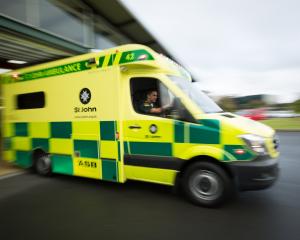The water crisis was a sign of deterioration in a crucial plank of public health - sanitation.
It showed ''vulnerability'' and a lack of leadership in public health and crisis management.
''It is a very serious event, and it shouldn't have happened.''
Sir David (68) used the lecture at the University of Otago to consider the long-term effect of scrapping the short-lived Public Health Commission - of which he was chairman - in 1995.
''Sadly, my conclusion is we are back where we were in the 1980s. There's a real vacuum of leadership in public health,'' Sir David told the Otago Daily Times.
Public health refers to actions applied widely rather than to individuals, such as regulating alcohol and public sanitation.
Sir David was careful to say the official report on the water crisis had not been completed and he would not pre-empt its conclusions.
But ''something like that shouldn't happen''.
Asked if it could happen again, he said: ''I think it's likely.''
''If it can happen in a place like Havelock North, it just shows there is a vulnerability in our current set-up.''
Sir David got the ''clear impression that there was not an adequate rapid response'' once the crisis developed.
''It seemed to be left to the people in the regional public health office.
''Over 5000 people infected with what is a really serious condition, it's not just a tummy bug. Some of those people will have consequences for the rest of their lives.''
As well as Guillain-Barre syndrome, campylobacter sufferers could develop arthritis.
However, the most pressing public health problem was alcohol.
''It's huge - that was something we highlighted in the 1990s, and it hasn't got any better, it's got worse.''
The Public Health Commission, which only lasted from 1992 to 1995, was well resourced and its independence was guaranteed.
Murray McCully, then a junior minister, described it as a ''bunch of cretins and pointy-headed wasters''.
''I'm quite proud of it actually,'' Sir David says of Mr McCully's 1993 letter to then associate health minister Maurice Williamson.
The commission had ''greatly upset'' the food, alcohol and tobacco industries.
Sir David said he did not expect governments to adopt all public health advice, as life involved ''trade-offs'' for individuals as well as countries.
But an independent body provided a structure to promote public health and allowed the public to see the trade-offs and compromises.
Now, public health advocates tended to work individually and lacked organisational clout.
''Public health is too important to be left to individual academics doing something on their Sunday afternoons.
''I would like to see something like a public health commission established again.
''Inevitably, in public health you're challenging vested interests.''
He disagreed with the Government's childhood obesity strategy, as it focused on targeting individual families rather than societal measures.
New Zealand had fallen behind some countries it used to lead in public health statistics such as infant mortality. However, Sir David told the ODT not to overplay his concerns, saying people who claimed New Zealand was becoming a ''Third World'' country were wrong.
Sir David, an epidemiology researcher, is no longer employed by the University of Otago but has an office there, and works with entities such as the World Health Organisation.
The lecture was organised by Prof Robin Gauld, head of the department of preventive and social medicine.












